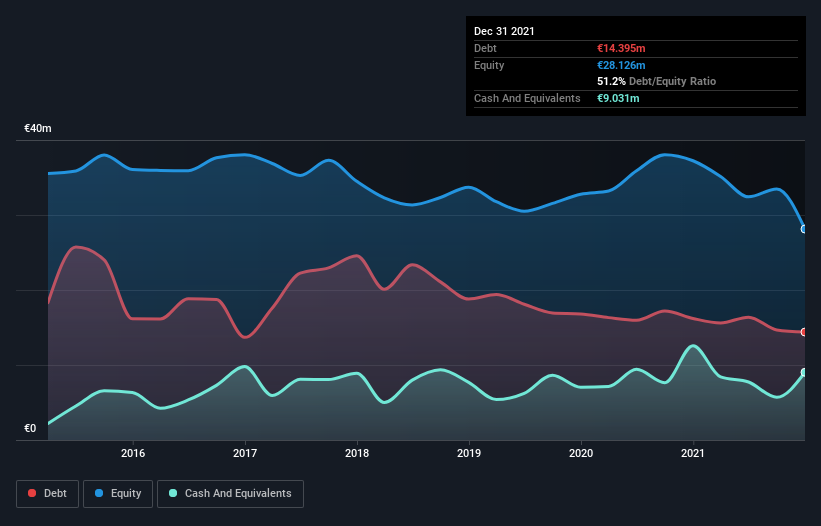
Warren Buffett famously said, 'Volatility is far from synonymous with risk.' So it might be obvious that you need to consider debt, when you think about how risky any given stock is, because too much debt can sink a company. We can see that Nordecon AS (TAL:NCN1T) does use debt in its business. But is this debt a concern to shareholders?
Why Does Debt Bring Risk?
Debt assists a business until the business has trouble paying it off, either with new capital or with free cash flow. Part and parcel of capitalism is the process of 'creative destruction' where failed businesses are mercilessly liquidated by their bankers. However, a more frequent (but still costly) occurrence is where a company must issue shares at bargain-basement prices, permanently diluting shareholders, just to shore up its balance sheet. Having said that, the most common situation is where a company manages its debt reasonably well - and to its own advantage. The first step when considering a company's debt levels is to consider its cash and debt together.
See our latest analysis for Nordecon
What Is Nordecon's Debt?
The image below, which you can click on for greater detail, shows that Nordecon had debt of €14.4m at the end of December 2021, a reduction from €16.2m over a year. On the flip side, it has €9.03m in cash leading to net debt of about €5.36m.

How Strong Is Nordecon's Balance Sheet?
According to the last reported balance sheet, Nordecon had liabilities of €93.3m due within 12 months, and liabilities of €13.6m due beyond 12 months. On the other hand, it had cash of €9.03m and €48.1m worth of receivables due within a year. So it has liabilities totalling €49.8m more than its cash and near-term receivables, combined.
This deficit casts a shadow over the €26.9m company, like a colossus towering over mere mortals. So we definitely think shareholders need to watch this one closely. After all, Nordecon would likely require a major re-capitalisation if it had to pay its creditors today. There's no doubt that we learn most about debt from the balance sheet. But it is future earnings, more than anything, that will determine Nordecon's ability to maintain a healthy balance sheet going forward. So if you're focused on the future you can check out this free report showing analyst profit forecasts.
In the last year Nordecon had a loss before interest and tax, and actually shrunk its revenue by 2.5%, to €289m. We would much prefer see growth.
Caveat Emptor
Importantly, Nordecon had an earnings before interest and tax (EBIT) loss over the last year. To be specific the EBIT loss came in at €1.3m. When we look at that alongside the significant liabilities, we're not particularly confident about the company. We'd want to see some strong near-term improvements before getting too interested in the stock. For example, we would not want to see a repeat of last year's loss of €6.3m. In the meantime, we consider the stock to be risky. There's no doubt that we learn most about debt from the balance sheet. However, not all investment risk resides within the balance sheet - far from it. Case in point: We've spotted 4 warning signs for Nordecon you should be aware of, and 1 of them is concerning.
If you're interested in investing in businesses that can grow profits without the burden of debt, then check out this free list of growing businesses that have net cash on the balance sheet.
Valuation is complex, but we're here to simplify it.
Discover if Nordecon might be undervalued or overvalued with our detailed analysis, featuring fair value estimates, potential risks, dividends, insider trades, and its financial condition.
Access Free AnalysisHave feedback on this article? Concerned about the content? Get in touch with us directly. Alternatively, email editorial-team (at) simplywallst.com.
This article by Simply Wall St is general in nature. We provide commentary based on historical data and analyst forecasts only using an unbiased methodology and our articles are not intended to be financial advice. It does not constitute a recommendation to buy or sell any stock, and does not take account of your objectives, or your financial situation. We aim to bring you long-term focused analysis driven by fundamental data. Note that our analysis may not factor in the latest price-sensitive company announcements or qualitative material. Simply Wall St has no position in any stocks mentioned.
About TLSE:NCN1T
Nordecon
Operates as a construction company in Estonia, Sweden, Finland, Ukraine, Latvia, and Lithuania.
Excellent balance sheet with acceptable track record.
Similar Companies
Market Insights
Community Narratives



